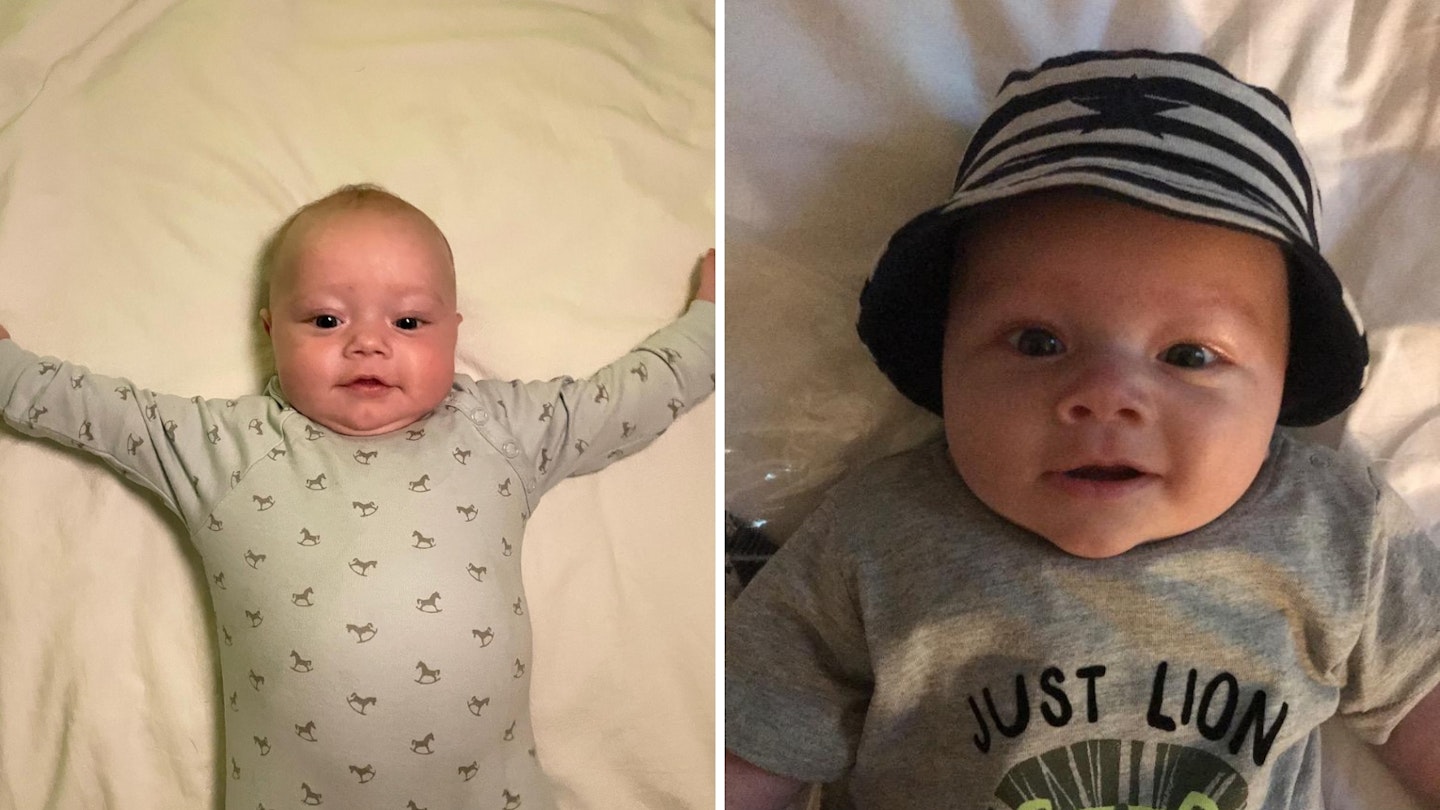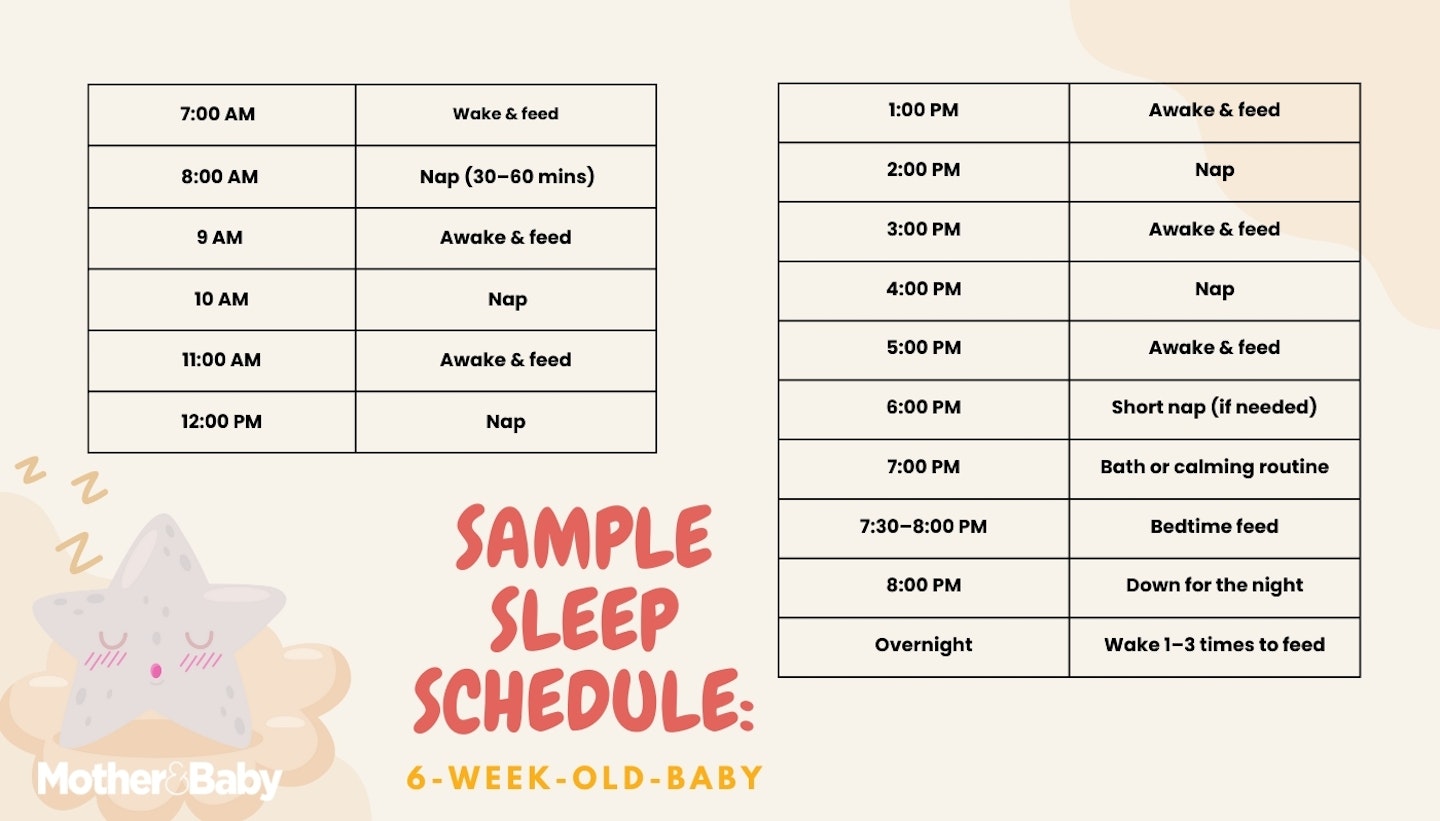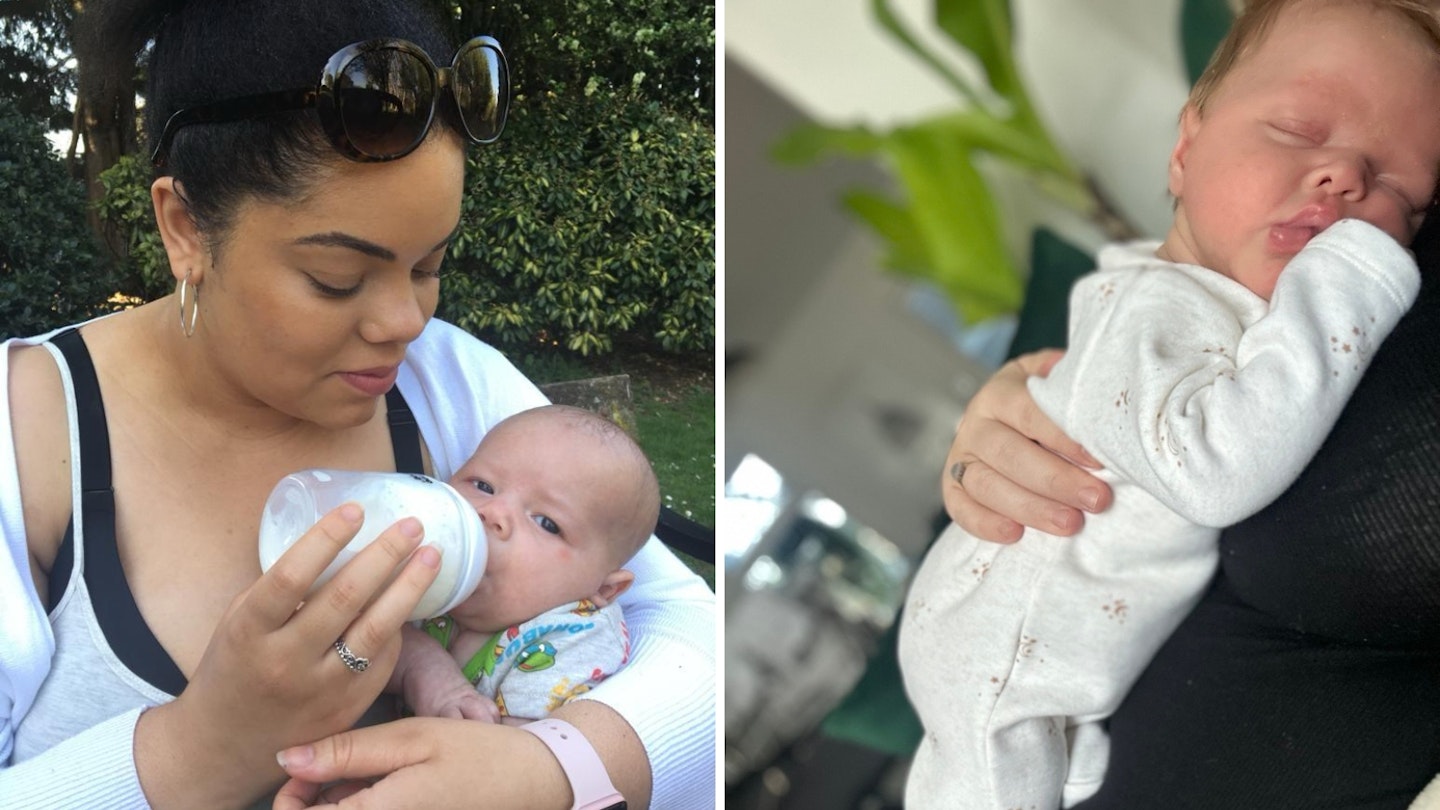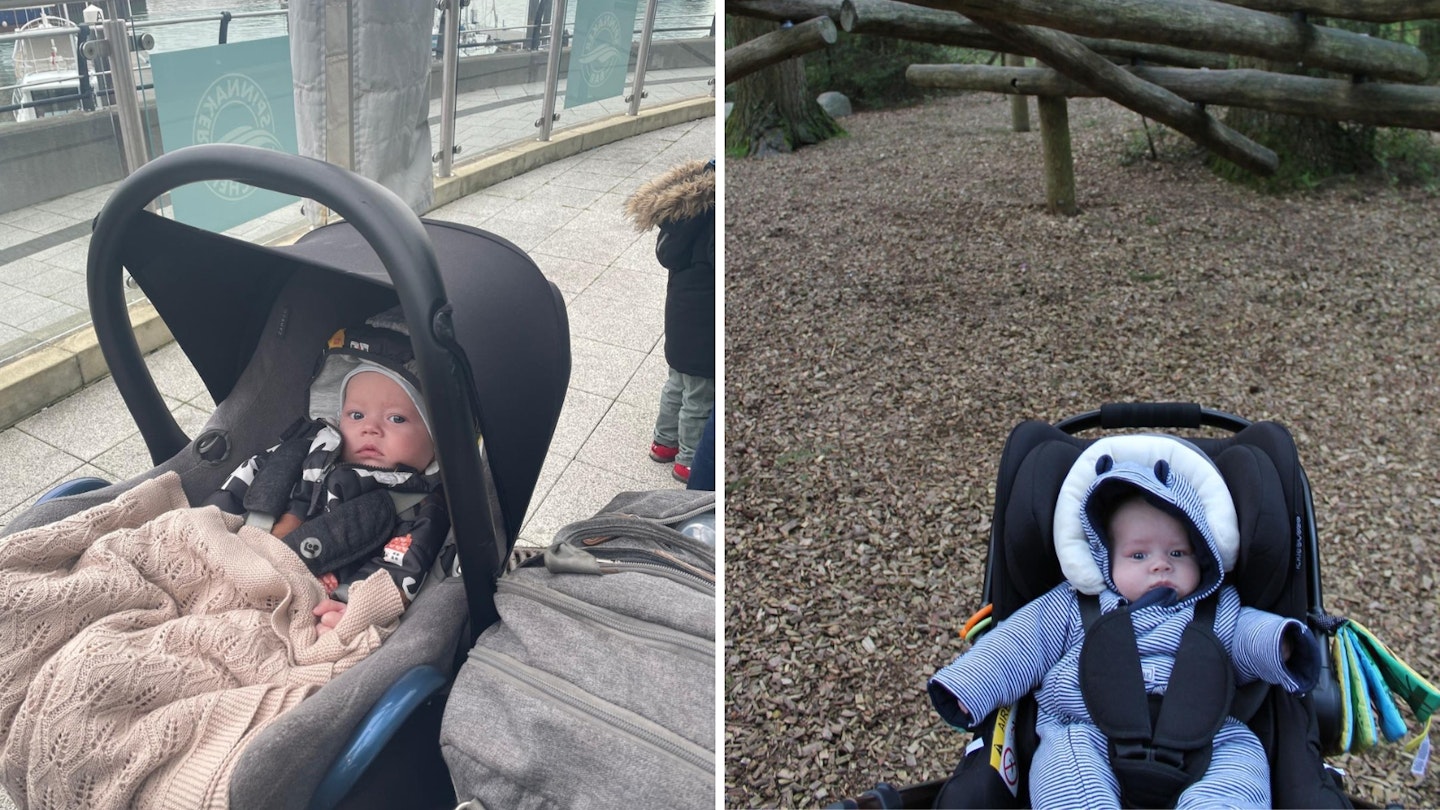Medically Reviewed by: Dr Alexis Missick
At 6 weeks old, your baby is beginning to wake up to the world around them, and you might be feeling all the highs and challenges that come with it. Backed by expert insights from experienced General Practitioner Dr Alexis Missick, we will guide you through what to expect this week, from exciting developmental milestones to typical sleep schedules and feeding patterns.
Your little one might start making more eye contact, sweet cooing sounds, and even showing the first signs of their spectacular smile. You may also feel like your baby is growing out of all of their newborn sleep suits, but growth spurts and fussy periods are common now. Rest assured, these changes are completely normal and signs that your baby is developing just as they should.
Let’s take a closer look at what’s going on in your baby’s world at six weeks and how you can gently support their growth while caring for yourself, too. Please remember that every baby is different, and whatever you're experiencing right now is all part of your family's exciting journey.

Development Milestones for a 6-week-old baby
Physical development of your 6-week-old baby
-
Your baby's neck strength is improving - Your baby may have started lifting their head briefly during tummy time from around four weeks. They’ll likely hold it up a little longer and with more control.
-
More fluid limb movements - Those jerky newborn reflexes are beginning to smooth out. Your baby’s arms and legs will start moving with more purpose, even if they still haven't mastered it at times.
-
Growing fast - You might notice a sudden growth spurt this week. We know all too well the heartbreak of putting those first onesies into storage. Babies often feed more frequently during this time to support rapid growth.
Dr Missick says some of the biggest physical developments will be with their hands and limbs. "At six weeks, babies will open their hands briefly, move both arms and legs, start holding their head up when on their tummy and make facial movements like smiles," says Dr Missick. "Parents can help by going in front of them when they are on tummy time, which will encourage them to raise their head."
Cognitive development of your 6-week-old baby
-
Starts to recognise familiar faces and voices - Your little baby may begin to recognise your voice. You may have noticed that they turn and stare at your face more intently when they speak. This exciting milestone is an early sign of social connection.
-
Improved visual tracking - Since around week four, your baby has been trying to follow moving objects. Now, they may track you across a room or follow a toy with their eyes more smoothly.
-
More alert and awake periods- Wakey, wakey. Your baby is more aware of their surroundings and is gradually increasing their awake time, though they still need plenty of sleep!
"At 6 weeks, their hearing and vision have improved significantly, so they are able to watch people as they move, differentiate them from others, and look at a toy for several seconds," says Dr Missick. That means that by week 6, your baby may be able to recognise you and distinguish you from a stranger. You might notice this if they gurgle and grunt when you look at them up close.
Emotional and Social Development of your 6-week-old baby
-
First smiles - In our opinion, this is one of the most exciting developments. If you haven’t seen one yet, that first gummy smile might appear any day now. Babies often begin social smiling around six weeks, responding to your voice or face.
-
Beginnings of cooing and babbling - Your baby may have started making vowel-like sounds. This early 'conversation' helps build language skills and emotional connection between you and your baby, so engage and enjoy a little bit of daily chit-chat.
-
Soothing and bonding- While crying may still be common (especially at nighttime), your baby may be starting to respond a little bit better to comforting techniques, like rocking or a soothing lullaby.

Sleep Patterns and routine for a 6-week-old baby
By six weeks old, your baby is still sleeping a lot, typically 14 to 17 hours a day, but sleep may still feel unpredictable (and like you're getting hardly any). It’s completely normal at this stage for days and nights to blur a little, but you're soon starting to notice early patterns emerge.
Babies are usually awake for around 45 to 60 minutes at this age. That means you’ll have about an hour (sometimes less) after your baby wakes up before it’s time for another nap.

Our top tips to encourage healthy sleep habits at 6 weeks
-
Start a simple bedtime routine - A warm bath, gentle baby massage, swaddle, and lullaby can help signal sleep time.
-
Use light and dark cues - Keep daytime bright and interactive, and dim lights in the evening to help set your baby’s internal clock.
-
Try to keep naps in the crib or bassinet - While snuggly naps in your arms are wonderful, mixing in cot naps can help with future sleep training.
-
Keep calm and carry on - At six weeks, sleep can still feel all over the place. And that’s okay. You're learning your baby’s rhythms, and soon it will all feel a lot smoother.
"Night-time sleep tends to have more increments of feeding periods than later months. There is also more daytime sleeping in the early weeks," advises Dr Missick.

Feeding and Nutrition for a 6-week-old baby
At 6 weeks, your little milk monster is just coming off the back of their first big growth spurt, which likely meant constant feeding and cluster sessions over the past couple of weeks. But the good news is that things may start to settle now. Whether you’re breastfeeding, formula feeding, or doing a combination, it's now really important to respond to your baby’s cues.
Hunger cues, which indicate that your baby is hungry:
-
Rooting
-
Sucking on hands
-
Lip-smacking
-
Restlessness or fussing
How Often Should a 6-Week-Old Be feeding?
Most 6-week-olds feed every three to four hours, with some variation depending on the baby and whether they're breastfed or formula-fed. That usually works out to six to eight feeds in 24 hours.
Breastfeeding at 6 weeks old:
-
The average feed duration is 20–40 minutes per session. However, depending on your baby’s efficiency and alertness, it may be shorter or longer.
-
You may have noticed your baby might nurse more frequently in the evenings, which is usually called cluster feeding.
-
At this stage, many mums begin expressing milk occasionally, especially if their baby is feeding well and consistently. Doing this can offer flexibility as well as helping to maintain supply.
Formula feeding at 6 weeks old:
-
Generally, with a formula feed, the amount per feed should be 4–5 ounces (120–150 ml) every 3–4 hours.
According to Dr. Missick, babies typically need 150–200 ml per kilogram of body weight per day. For example, a 10-lb baby might need 675–900 ml over 24 hours. But don’t worry too much about hitting exact numbers; your baby will eat as much as they need.

Your baby's health and safety: tips for a 6-week-old baby
General Health & When to Seek Medical Advice
-
Regular growth tracking - At six weeks, your baby should be steadily gaining weight, though every baby is different. If you're concerned about weight gain or feeding, speak to your GP or health visitor.
-
Spit-up vs vomiting - Spit-up (reflux) is common and usually not a concern unless your baby seems distressed or is not gaining weight. Vomiting is more forceful and may need medical attention—especially if persistent or contains green bile.
When to seek help:
-
Your baby has a high-pitched or weak cry
-
Less than six wet nappies in 24 hours
-
Signs of dehydration (dry mouth, sunken fontanelle, listlessness)
-
Projectile vomiting, or blood in stool or vomit
-
Lethargy or poor feeding
Vaccinations
Your baby’s first routine vaccinations are usually given at around eight weeks old. It’s completely normal to feel a little nervous. Planning ahead can help. You might find it reassuring to bring a partner, friend, or family member with you for support. Dressing your baby in loose, easy-to-remove clothing can make the appointment quicker and more comfortable. Speak with your GP if you haven’t already received the vaccination schedule by the end of the week.
At eight weeks, your baby will be offered the following NHS-recommended vaccines:
-
6-in-1 vaccine (DTaP/IPV/Hib/HepB): Protects against diphtheria, tetanus, whooping cough, polio, Haemophilus influenzae type b, and hepatitis B.
-
Pneumococcal (PCV): Protects against pneumococcal infections, which can cause pneumonia, meningitis, and sepsis.
-
Rotavirus oral vaccine: Protects against rotavirus, a common cause of diarrhoea and vomiting in babies.
-
MenB vaccine: Protects against meningococcal group B bacteria, a serious cause of meningitis and sepsis.

Hygiene and skin care for a 6-week-old baby
At 6 weeks, your baby’s skin is still very delicate, so stick to gentle, fragrance-free products and avoid overbathing. Here's some information which can help you keep your baby clean.
Nappy rash prevention:
-
Change nappies every two to three hours, or immediately after a poo. (Some nappies have indicators)
-
Use unscented wipes or plain water for cleaning.
-
Apply a barrier cream to protect the skin.
-
Consider trying different nappy brands or switching to reusables if rash persists.
Baby baths:
Bathing 2–3 times per week is usually sufficient unless your baby needs more frequent cleaning.
**Sun protection:
**Babies under six months should be kept out of direct sunlight, as their skin contains too little melanin to protect against UV damage.
Use SPF 30 or higher sunscreen with UVA and UVB protection if sun exposure can’t be avoided.
Dress your baby in lightweight clothing and a wide-brimmed hat that protects their neck.
Keep your baby in the shade and ensure they stay cool and hydrated.
Breastfed babies: Offer more frequent feeds; no water is needed.
Formula-fed babies: Offer their usual milk and, in very hot weather, small amounts of cooled, boiled water.
**Safe Sleep & Home Environment:
**Always place your baby on their back to sleep in a clear, flat, and firm sleep space.
Keep the cot free of pillows, toys, and loose bedding to reduce the risk of SIDS.
Avoid overheating. Keep the room at 16–20°C and dress your baby in light layers.
Maintain a smoke-free environment at all times, both indoors and in the car.
6-week-old baby check-up
Your Baby's 6–8 Week Check
Around this age, your baby will be offered their 6–8 week development review with a GP. This is an important opportunity to check your baby’s physical development and ask any questions.
What the GP will check:
-
Hips and leg joints for signs of developmental dysplasia
-
Spine alignment and posture
-
Heart sounds to rule out murmurs
-
Eyes for focus and reaction to light
-
Reflexes, such as the startle reflex
-
Genitals, to check for normal development
This appointment is also a chance to check in on you, the parent. Don't hesitate to speak up if you're experiencing physical discomfort, emotional changes, or challenges like colic, feeding, or sleep. There’s no shame in asking for support. This check is as much about your well-being as your baby’s.
You should also be offered a postnatal check-up, where your GP will assess your physical recovery, including blood pressure, healing from stitches, or any ongoing issues related to the birth.
If you’ve been struggling with anything in particular, whether it’s colic, sleeping or your own emotions, there is no shame in admitting you need some help. During this appointment, your GP can check how you’re doing physically too, whether that’s your stitches or just blood pressure. However, you should also have a postnatal appointment where they can check you over fully and ensure your body is recovering after giving birth.
Looking After Yourself
Six weeks after giving birth, it's completely normal to still be finding your feet. Your body and mind have been through so much. Looking after yourself is just as important as caring for your baby. Try to be gentle with yourself. Rest when you can, accept help without guilt, and remember that small moments of self-care matter.
If things feel overwhelming, know you’re not alone, and reaching out for support is okay. Healing takes time, and you are doing a fantastic job, even on hard days.
{#h-how-much-should-a-6-week-old-baby-be-pooing}
Your FAQS about 6-week babies answered
How often should a 6-week-old baby poo?
Anywhere from 1 to 10 times a day is normal, as long as they wet their nappy about 6 times daily. Dr Missick says you’ll probably be changing nappies up to 12 times a day.
Is it normal for my 6-week-old to be fussy in the evenings?
Yes, many babies experience a 'witching hour' in the late afternoon or evening. It's common and usually peaks around 6–8 weeks before improving.
How much should a 6-week-old baby be sleeping?
Most 6-week-olds sleep about 14–17 hours over 24 hours, often in short stretches. Night wakings for feeds are still completely normal.
About the expert:
Dr Alexis Missick is an experienced General Practitioner who works with UK Meds. Dr Missick has worked in the NHS for over 10 years and has 6 years experience working internationally, mostly in the Caribbean. Her approach in General practice to prioritise helping patients better understand their health and engage in the process of improving it. She empowers her patients via patient education to share in their journey to better patient health and has lots of experience and knowledge relating to hair loss.
About the author
Hannah Carroll is our Senior Digital Writer. In her capacity, she curates top-notch listicles, crafts insightful how-to guides, and delivers expert product reviews. As a mother of three, Hannah draws upon her comprehensive understanding of all facets of family life to bring true insight into all the products that make running a home easier.
